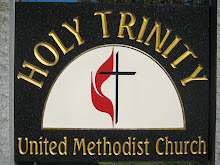through
the looking glass
The
work on the Church building is complete. It has been wondrous to
watch the various pieces come together. We have talked about this
renovation as an opportunity for a new beginning. Beyond the new look
is the new us. How will we change? How can a new look be reflected
in a new way of being?
I
have been reading recently a little book entitled Breakfast
with Buddha. It is
fiction but as is true of any good fiction it is about life and how
it is lived. This story has to do with a man who is relatively
successful and just a regular guy who finds himself driving a holy
man from the East across the United States. The book is really about
how we see the world and what is at stake with our souls and the
spiritual reality in general. At one point in the book the holy man
says this: Everyday,
he said, many times every day, you can go one way or the other way.
You can go with anger or not go. Go with greed or not go. Go with
hate or not go. And
so on. Later he said these
feel like small things, small choices, but every day, across one
life, across many lives, if you choose the good way, again and again
and again, in what you are thinking and what you are doing it
changes you.
New
beginnings mean change. We have changed the building. Can we change
our hearts? If we need a word to guide us, the writer of the letter
to the Ephesians put it plainly and practically, revealing, also,
that the need for a change of heart has been with us in the church
since the very beginning: Let
no evil talk come out of your mouths, but only what is useful for
building up, as there is need, so that your words may give grace to
those who hear. Put away from you all bitterness and wrath and anger
and wrangling and slander, together with all malice, and be kind to
one another, tenderhearted, forgiving one another, as God in Christ
as forgiven you. (Ephesians
4: 29, 31)
When
Bishop Reuben Job wrote his little book on the Three Simple Rules
reflecting on John Wesley's General Rules for Methodist Societies he
wrote how the practice of the first rule "Do no Harm"
changed how he dealt with conflict and disagreement. I
have also found, he
wrote, that this first
simple step, when practiced, can provide a safe place to stand while
the hard and faithful work of discernment is done. When we agree that
we will not harm those with whom we disagree, conversation, dialogue,
and discovery of new insight become possible. If I am to do no harm,
I can no longer gossip about the conflict. I can no longer speak
disparagingly about those involved in the conflict. I can no longer
manipulate the facts of the conflict. I can no longer diminish those
who do not agree with me and must honor each as a child of God.
What he does not say
and I would add is that I can also trust that when someone disagrees
with me they are not out to harm me and when I disagree with someone
they can know that I mean them no harm. Together we are discerning a
way we can go together. This is how it happens. In fact we need
different perspectives (disagreement) to have a complete vision of
the way forward but it won’t work until we learn how to disagree
without causing harm. May this new season be a time of new life as
together, celebrating even our differences, we practice loving one
another and finding our way together.
Larry
